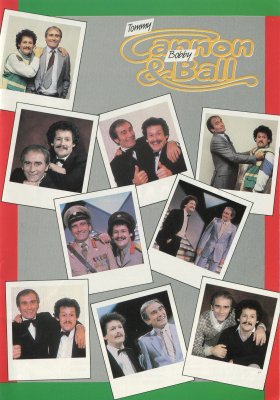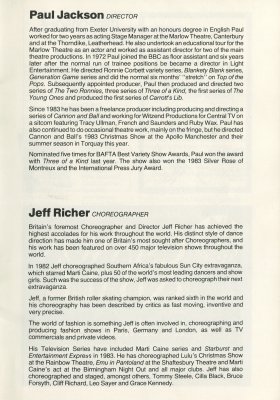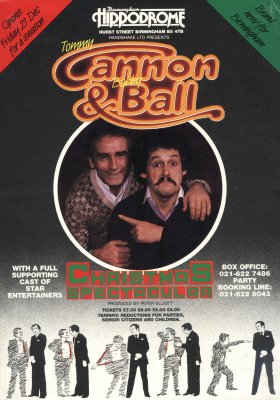
Programme
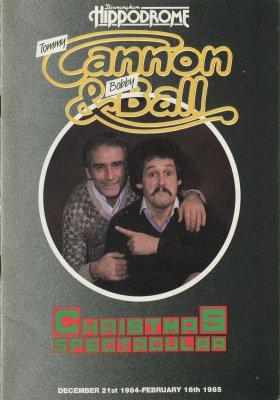
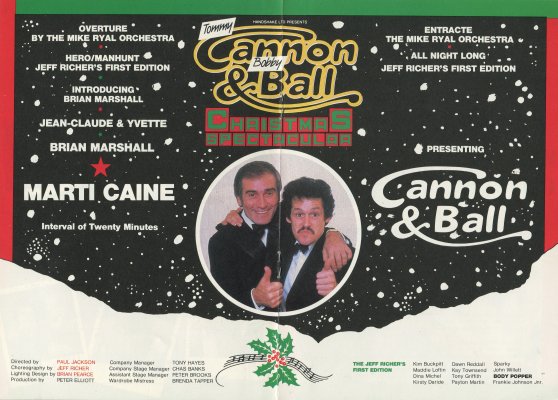
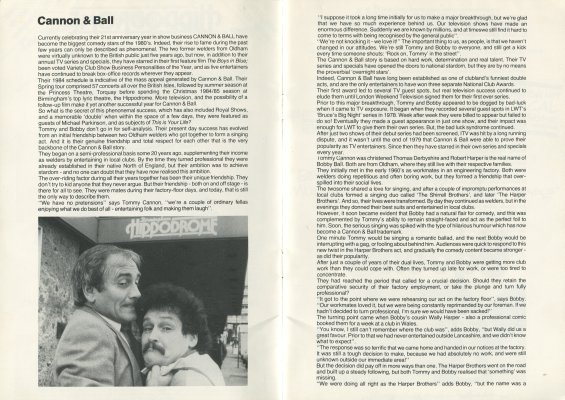 Cannon and Ball
Cannon and Ball
Currently celebrating their 21st anniversary year in show business Cannon and Ball have become the biggest comedy stars of the 1980’s. Indeed, their rise to fame during the past few years can only be described as phenomenal. The two former welders from Oldham were virtually unknown to the British public just five years ago, but now, in additino to their annual TV series and specials, they have starred in their first feature film The Boys In Blue, been voted Variety Club Show Business Personalities of the Year, and as live entertainers have continued to break box-office records wherever they appear.
Their 1984 schedule is indicative of the mass appeal generated by Cannon and Ball. Their Spring Tour comprised 57 concerts all over the British Isles, followed by summer season at the Princess Theatre, Torquay, before spending the Christmas 1984/85 season at Birmingham’s top lyric theatre, the Hippodrome. More television, and the possibility of a follow-up film make it yet another successful year for Cannon and Ball.
So what is the secret of this phenomenal success, which has also included Royal Shows and a memorable ‘double’ when within the space of a few daysm they were featured as guests of Michael Parkinson, and as subjects of This Is Your Like?
Tommy and Bobby don’t go in for self-analysis. Their present day success has evolved from an initial friendship between two Oldham welders who got together to form a singing act. And it is their genuine friendship and total respect for each other that is the very backbone of the Cannon and Ball story.
They began on a semi-professional basis some 20 years ago, supplementing their income as welders by entertaining in local clubs. By the time they turned professional they were already established in their native North of England, but their ambition was to achieve stardom – and no-one can doubt that they have now realised this ambition.
The over-riding factor during all their years together has been their unique friendship. They don’t try to kid anyone that they never argue. But their friendship – both on and off stage – is there for all to see. They were mates during their factory-floor days, and today, that is still the only way to describe them.
“We have no pretensions,” says Tommy Cannon, “we’re a couple of ordinary fellas enjoying what we do best of all – entertaining folk and making them laugh.”
“I suppose it took a long time initially for us to make a major breakthrough, but we’re glad that we have so much experience behind us. Our television shows have made an enormous difference. Suddenly we are known by millions, and at time still find it hard to come to terms with being recognised by the general public.”
“We’re not knocking it – we love it! The importa thing to us as people is that we haven’t changed in our attitudes. We’re still Tommy and Bobby to everyone, and still get a kick every time someone shouts ‘Rock On, Tommy’ in the street.”
The Cannon and Ball story is based on hard work, determination and real talent. Their TV series and specials have opened the doors to national stardom, but they are by no means the proverbial ‘overnight stars’.
Indeed, Cannon and Ball have long been established as one of clubland’s funniest double acts, and are the only entertainers to have won three seperate National Club Awards.
Their first award led to several TV guest spots, but real television success continued to elude them until London Weekend Television signed them for their first ever series.
Prior to this major breakthrough, Tommy and Bobby appeared to be dogged by bad luck when it came to TV exposure. It began when they recorded several guest spots in LWT’s ‘Bruces Big Night’ series in 1978. Week after week they were billed to appear but failed to do so! Eventually they made a guest appearance in just one show, and their impact was enough for LWT to give them their own series. But, the bad luck syndrome continued.
After just two shows of their debut series had been screened, ITV was hit by a long running dispute, and it wasn’t until the end of 1979 that Cannon and Ball were able to prove their popularity as TV entertainers. Since then they have starred in their own series and specials every year.
Tommy Cannon was christened Thomas Derbyshire and Robert Harper is the real name of Bobby Ball. Both are from Oldham where they still live with their respective families.
They initially met in early 1960’s as workmates in an engineering factory. Both were welders doing repetitious and often boring work, but they formed a friendship that overspilled into their social lives.
The twosome shared a love for singing, and after a couple of impromptu performances at local clubs formed a singing duo called ‘The Shirrell Brothers’, and later ‘The Harper Brothers’. And so, their lives were transformed. By day they continued as welders, but in the evenings they donned their best suits and entertained in local clubs.
However, it soon became evident that Bobby had a natural flair for comedy, and this was complemented by Tommy’s ability to remain straight-faced and act as the perfect foil to him. Soon, the serious singing was spiked with the type of hilarious humour which has now become a Cannon and Ball trademark.
One minute Tommy would be singing a romantic ballad, and the next Bobby would be interrupting with a gag or fooling about behind him. Audiences were quick to respond to this new twist in the Harper Brothers act, and gradually the comedy content became stronger – as did their popularity.
After just a couple of years of thier dual lives, Tommy and Bobby were getting more club work than they could cope with. Often they turned up late for work, or were too tired to concentrate.
They had reached the period that calle dfor a crucial decision. Should they retain the comparative security of their factory employment, or take the plunge and turn fully professional?
“It got to the point where we were rehearsing our act on the factory floor,” says Bobby. “Our workmate loved it, but we were being constantly reprimanded by our foreman. If we hadn’t decided to turn professional, I’m sure we would have been sacked!”
The turning point came when Bobby’s cousin Wally Harper – also a professional comic booked them for a week at a club in Wales.
“You know, I still can’t remember where the club was”, adds Bobby, “but Wally did us a great favour. Prior to that we had never entertained outside Lancashire, and we didn’t know what to expect”.
“The response was so terrific that we came home and handed in our notices at the factory. It was still a tough decision to make, because we had absolutely no work, and were still unknown outside our immediate area!”
But the decision did pay off in more ways than one. The Harper Brothers went on the road and built up a steady following, but both Tommy and Bobby realised that ‘something’ was missing.
“We were doing all right as the Harper Brothers” adds Bobby, “but the name was a drawback. It had little appeal and certainly didn’t convey the fact that we were a comedy duo. We needed something catchy. Something to attract attention and make the public sit up and take notice”.
So, Bobby and Tommy sat down and thought of as many names as they could. Tommy had always admired Freddie Cannon, the American singer, and both agreed that Cannon was an acceptable name. Finding something appropriate to go with it was far more difficult!
“Ball is the obvious pairing with Cannon” adda Bobby, “but to be honest I thought it was a bit daft to call ourselves Cannon and Ball. However, the more we kept saying it, the better it sounded and the combination offered everything we wanted: names that would be noticed, with the added bonus of being funny in their own right!”
And, Tommy and Bobby’s choices could not have been more appropriate, because their success relies on the firepower of Tommy Cannon and the sheer comedy ammunition of Bobby Ball.
Their styles both contrast and complement each other. Tommy is the smart one with a good singing voice, immaculate dress sense, and comedy abilities which make him much more than a convential straight man. He’s Bobby’s foil, adviser and friend all rolled into one. In contrast, Bobby has a penchant for baggy suits, shaking legs and twanging braces – allied to a daft sense of fun that is totally infectious.
Collectively, Cannon and Ball offer a unique blend of comedy, pathos and singing talents that readily make them one of the top attractions in the country. This blend, and their undoubted warmth and appeal as personalities, make up a Cannon and Ball pedigree that undoubtedly puts them in a class of their own.
Having initially built up their popularity on the huge northern club circuit, the fame of Cannon and Ball spread to other parts of the country until they were voted Top Comedy Act in clubland.
That award became a lucky charm to them, because it led to their debut TV appearance in Granada’s Wheeltappers and Shunters Social Club, where Cannon and Balls hilarious brand of humour was seen by viewers for the very first time – since when TV has become their most successful medium.
Their series and specials are always in the top TV ratings, but they are not the types to sit back on their laurels. Indeed, Cannon and Ball remain top club attractions, and their theatre successes speak for themselves. Their debut on the West End stage, at London’s Dominion Theatre, was assured of success even before the curtain rose on their first show – with advance tickets sales setting yet more records for Cannon and Ball.
Their professional success is also mirrored in their private lives. Both Tommy and Bobby are happily married and still live close to each other in their native Lancashire. Tommy is married to Margaret, and they have two daughters, Janette and Julie, and a grandson Ben Thomas. Bobby’s wife is Yvonne and they have a daughter Joanne. Bobby also retains close links with his sons, Darren and Robert from his first marriage.
In their increasingly rare off-stage moments, both Tmmy and Bobby like to keep fit, and while Bobby prefers to sit on a river bank fishing (he enjoys the solitude) Tommy is at his happiest on the nearest golf course.
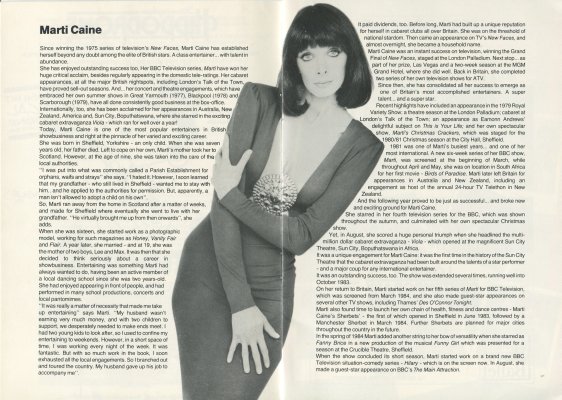 Marti Caine
Marti Caine
Since winning the 1975 series of television’s New Faces, Marti Caine has established herself beyond any doubt among the elite of British stars. A class entertainer… with talent in abundance.
She has enjoyed outstanding success too, Her BBC Television series, Marti have won her huge critical acclaim, besides regularly appearing in the domestic tele-ratings. Her cabaret appearances, at all the major British nightspots, including London’s Talk of the Town, have proved sell-out seasons. And… her concert and theatre engagements, which have embraced her own summer shows in Great Yarmouth (1977), Blackpool (1978) and Scarborough (1979), have all done consistently good business at the box-office.
Internationally, too, she has been acclaimed for her appearances in Australia, New Zealand, America and, Sun City, Boputhatswana, where she starred in the exciting cabaret extravaganza Viola – which ran for well over a year!
Today, Marti Caine is one of the most popular entertainers in British showbusiness and right at the pinnacle of her varied and exciting career. She was born in Sheffield, Yorkshire – an only child. When she was seven years old, her father died. Left to cope on her own, Marti’s mother took her to Scotland. However, at the age of nine, she was taken into the care of the local authorities.
“I was put into what was commonly called a Parish Establishment for orphans, waifs and strays” she says. “I hated it. However, I soon learned that my grandfather – who still lived in Sheffield – wanted me to stay with him., and he applied to the authorities for permission. But, apparently, a man isn’t allowed to adopt a child on his own”.
So, Marti ran away from the home in Scotland after a matter of weeks, and made for Sheffield where eventually she went to live with her grandfather. “He virtually brought me up from then onwards”, she adds.
When she was sixteen, she started work as a photographic model, working for such magazines as Honey, Vanity Fair and Flair. A year later, she married – and at 19, she was the mother of two boys, Lee and Max. It was then that she decided to think seriously about a career in showbusiness. Entertaining was something Marti had always wanted to do, having been an active member of a local dancing school since she was two years-old. She had enjoyed appearing in front of people, and had performed in many school productions, concerts and local pantomimes.
“It was really a matter of necessity that made me take up entertaining” says Marti. “My husband wasn’t earning very much money, and with two children to support, we desperately needed to make ends meet. I had two young kids to look after, so I used to confine my entertaining to weekends. However, in a short space of time, I was working every night of the week. It was fantastic. But with so much work in the book, I soon exhausted all the local engagements. So I branched out and toured the country. My husband gave up his job to accompany me”.
It paid dividends, too. Before long, Marti had built up a unique reputation for herself in cabaret clubs all over Britain. She was on the threshold of national stardom. Then came an appearance on TV’s New Faces, and almost overnight, she became a household name. Marti Caine was an instant success on television, winning the Grand Final of New Faces, staged at the London Palladium. Next stop… as part of her prize, Las Vegas and a two-week season at the MGM Grand Hotel, where she did well. Back in Britain, she completed two series of her own television shows for ATV. Since then, she has consolidated all her success to emerge as one of Britain’s most accomplished entertainers. A super talent… and a super star.
Recent highlights have included an appearance in the 1979 Royal Variety Show; a theatre season at the London Palladium; cabaret at London’s Talk of the Town; an appearance as Eamonn Andrews’ delightful subject on This is Your Life; and her own spectacular show, Marti’s Christmas Crackers, which was staged for the 1980/81 Christmas season at the City Hall, Sheffield.
1981 was one of Marti’s busiest years… and one of her most international. A new six-week series of her BBC show, Marti, was screened at the beginning of March, while throughout April and May, she was on location in South Africa for her first movie – Birds of Paradise. Marti later left Britain for appearances in Australia and New Zealand, including an engagement as host of the annual 24-hour TV Telethon in New Zealand.
And the following year proved to be just as successful… and broke new and exciting ground for Marti Caine.
She starred in her fourth television series for the BBC, which was shown throughout the autumn, and culminated with her own spectacular Christmas show.
Yet, in August, she scored a huge personal triumph when she headlined the multi-million dollar cabaret extravaganza – Viola – which opened at the magnificent Sun City Theatre, Sun City, Boputhatswana in Africa.
It was a unique engagement for Marti Caine: it was the first time in the history of the Sun City Theatre that the cabaret extravaganza had been built around the talents of a star performer – and a major coup for any international entertainer.
It was an outstanding success, too. The show was extended several times, running well into October 1983.
On her return to Britain, Marti started work on her fifth series of Marti for BBC Television, which was screened from March 1984, and she also made guest-star appearances on several other TV shows, including Thames’ Des O’Connor Tonight. Marti also found time to launch her own chain of health, fitness and dance centres – Marti Caine’s Sherbets’ – the first of which opened in Sheffield in June 1983, followed by a Manchester Sherbet in March 1984. Further Sherbets are planned for major cities throughout the country in the future.
In the spring of 1984 Marti added another string to her bow of versatility when she starred as Fanny Brice in a new production of the musical Funny Girl which was presented for a season at the Crucible Theatre, Sheffield.
When the show concluded its short season, Marti started work on a brand new BBC Television situation-comedy series – Hilary – which is on the screen now. In August, she made a guest-star appearance on BBC’s The Main Attraction.
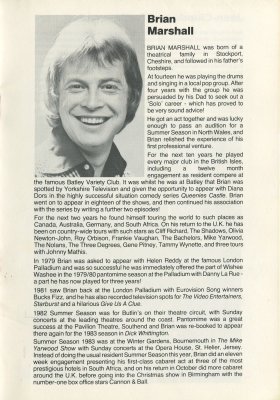 Brian Marshall
Brian Marshall
BRIAN MARSHALL was born of a theatrical family in Stockport, Cheshire, and followed in his father’s footsteps.
At fourteen he was playing the drums and singing in a local pop group. After four years with the group he was persuaded by his Dad to seek out a ‘Solo’ career – which has proved to be very sound advice! He got an act together and was lucky enough to pass an audition for a Summer Season in North Wales, and Brian relished the experience of his first professional venture.
For the next ten years he played every major club in the British Isles, including a twelve month engagement as resident compere at the famous Batley Variety Club. It was whilst he was at Batley that Brian was spotted by Yorkshire Television and given the opportunity to appear with Diana Dors in the highly successful situation comedy series Queenies Castle. Brian went on to appear in eighteen of the shows, and then continued his association with the series by writing a further two episodes!
For the next two years he found himself touring the world to such places as Canada, Australia, Germany, and South Africa. On his return to the U.K. he has been on country-wide tours with such stars as Cliff Richard, The Shadows, Olivia Newton-John, Roy Orbison, Frankie Vaughan, The Bachelors, Mike Yarwood, The Nolans, The Three Degrees, Gene Pitney, Tammy Wynette, and three tours with Johnny Mathis.
In 1979 Brian was asked to appear with Helen Reddy at the famous London Palladium and was so successful he was immediately offered the part of Wishee Washee in the 1979/80 pantomime season at the Palladium with Danny La Rue -a part he has now played for three years!
1981 saw Brian back at the London Palladium with Eurovision Song winners Bucks Fizz, and he has also recorded television spots for The Video Entertainers, Starburst and a hilarious Give Us A Clue.
1982 Summer Season was for Butlin’s on their theatre circuit, with Sunday concerts at the leading theatres around the coast. Pantomime was a great success at the Pavilion Theatre, Southend and Brian was re-booked to appear there again for the 1983 season in Dick Whittington.
Summer Season 1983 was at the Winter Gardens, Bournemouth in The Mike Yarwood Show with Sunday concerts at the Opera House, St. Helier, Jersey. Instead of doing the usual resident Summer Season this year, Brian did an eleven week engagement presenting his first-class cabaret act at three of the most prestigious hotels in South Africa, and on his return in October did more cabaret around the U.K. before going into the Christmas show in Birmingham with the number-one box office stars Cannon & Ball.
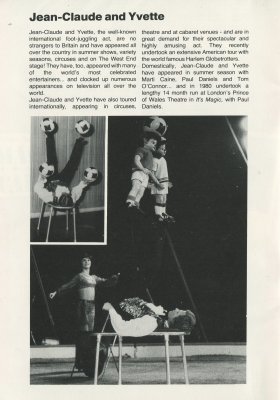 Jean-Claude and Yvette
Jean-Claude and Yvette
Jean-Claude and Yvette, the well-known international foot-juggling act, are no strangers to Britain and have appeared all over the country in summer shows, variety seasons, circuses and on The West End stage! They have, too, appeared with many of the world’s most celebrated entertainers… and clocked up numerous appearances on television all over the world.
Jean-Claude and Yvette have also toured internationally, appearing in circuses, theatre and at cabaret venues – and are in great demand for their spectacular and highly amusing act.
They recently undertook an extensive American tour with the world famous Harlem Globetrotters. Domestically, Jean-Claude and Yvette have appeared in summer season with Marti Caine, Paul Daniels and Tom O’Connor… and in 1980 undertook a lengthy 14 month run at London’s Prince of Wales Theatre in It’s Magic, with Paul Daniels.
Paul Jackson – DIRECTOR
After graduating from Exeter University with an honours degree in English Paul worked for two years as acting Stage Manager at the Marlow Theatre, Canterbury andattheThorndike, Leatherhead. He also undertook an educational tour for the Marlow Theatre as an actor and worked as assistant director for two of the main theatre productions. In 1972 Paul joined the BBC as floor assistant and six years later after the normal run of trainee positions be became a director in Light Entertainment. He directed Ronnie Corbett variety series, Blankety Blank series, Generation Game series and did the normal six months’ “stretch” on Top of the Pops. Subsequently appointed producer, Paul then produced and directed two series of The Two Ronnies, three series of Three of a Kind, the first series of The Young Ones and produced the first series of Carrott’s Lib.
Since 1983 he has been a freelance producer including producing and directing a series of Cannon and Ball and working for Witzend Productions for Central TV on a sitcom featuring Tracy Ullman, French and Saunders and Ruby Wax. Paul has also continued to do occasional theatre work, mainly on the fringe, but he directed Cannon and Ball’s 1983 Christmas Show at the Apollo Manchester and their summer season in Torquay this year.
Nominated five times for BAFTA Best Variety Show Awards, Paul won the award with Three of a Kind last year. The show also won the 1983 Silver Rose of Montreux and the International Press Jury Award.
Jeff Richer – CHOREOGRAPHER
Britain’s foremost Choreographer and Director Jeff Richer has achieved the highest accolades for his work throughout the world. His distinct style of dance direction has made him one of Britain’s most sought after Choreographers, and his work has been featured on over 450 major television shows throughout the world.
In 1982 Jeff choreographed Southern Africa’s fabulous Sun City extravaganza, which starred Marti Caine, plus 50 of the world’s most leading dancers and show girls. Such was the success of the show, Jeff was asked to choreograph their next extravaganza.
Jeff, a former British roller skating champion, was ranked sixth in the world and his choreography has been described by critics as fast moving, inventive and very precise.
The world of fashion is something Jeff is often involved in, choreographing and producing fashion shows in Paris, Germany and London, as well as TV commercials and private videos.
His Television Series have included Marti Caine series and Starburst and Entertainment Express in 1983. He has choreographed Lulu’s Christmas Show at the Rainbow Theatre, Emu in Pantoland at the Shaftesbury Theatre and Marti Caine’s act at the Birmingham Night Out and all major clubs. Jeff has also choreographed and staged, amongst others, Tommy Steele, Cilia Black, Bruce Forsyth, Cliff Richard, Leo Sayer and Grace Kennedy.
